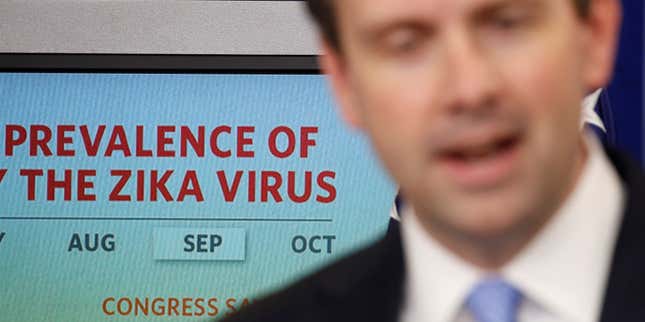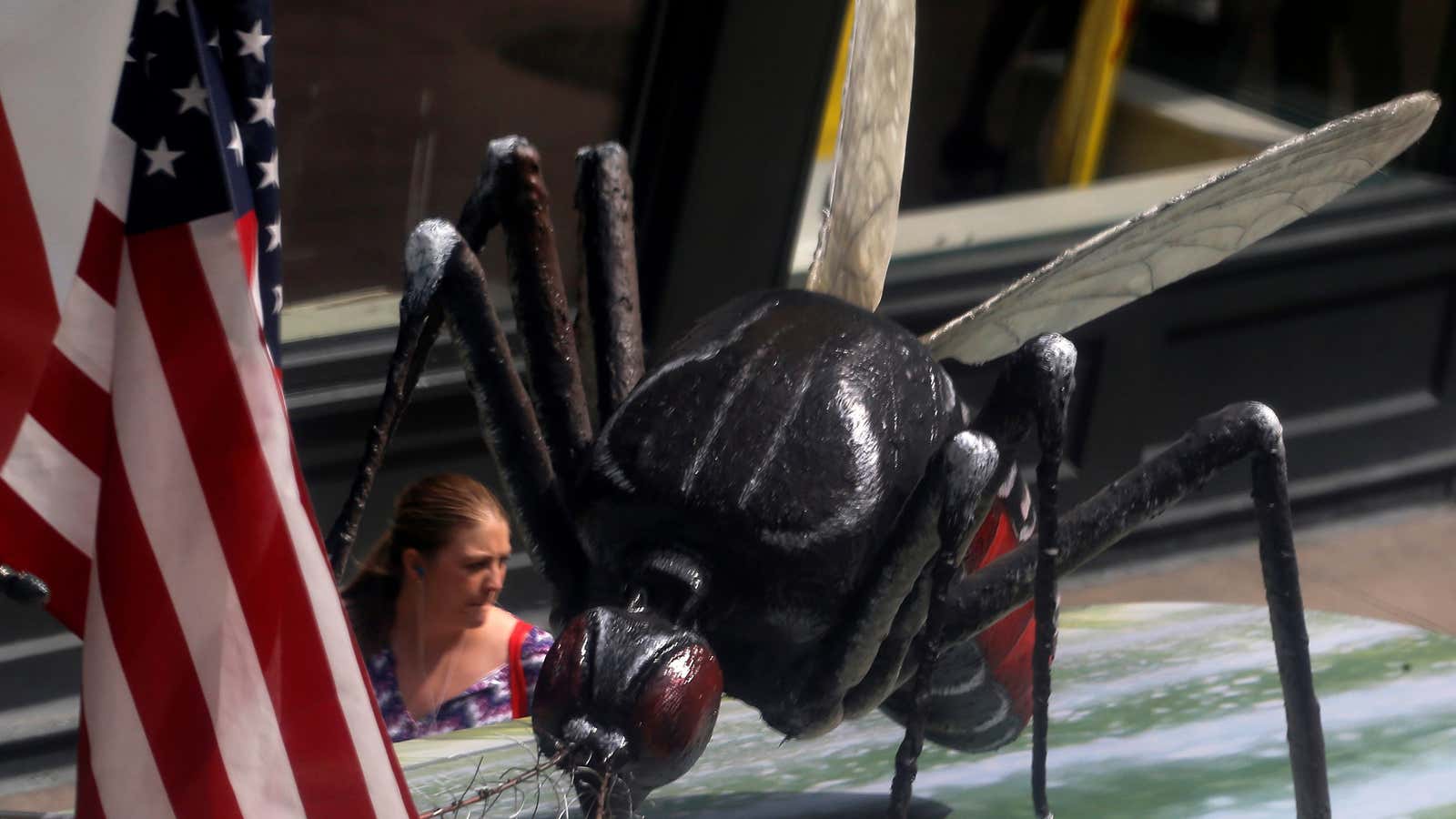Zika is a growing problem in the US–and partisan politics may make it much worse. As of this week (Aug.3), 1,825 cases of Zika had been identified in the continental US, and 15 babies had been born with Zika-related birth defects, including microcephaly, which causes debilitating health problems.
Yet the US government has failed to reach an agreement on funding Zika prevention and research, risking our health by using the epidemic as an opportunity to advance political agendas. It’s America’s poor that stand to suffer most.
A divisive political climate has crippled America’s response to epidemics like Zika, according to Dr. Georges C. Benjamin, executive director of the American Public Health Association. “As a rule we have seen more and more dysfunction around things in the public health sphere which were never controversial before,” Benjamin says. “Public health has always been controversial, but [outbreak funding] has never really been debatable.” Unfortunately, recent changes in the political climate, exemplified by the battle over the Affordable Care Act, have made this funding contentious like never before.
While politicians have wasted time figuring out how to handle Zika, the virus has gotten a foothold in the US. In Florida last week, four cases of Zika caused by local transmission were identified. Early last month, a Utah man died from Zika, and doctors don’t know how it killed him or how he contracted the disease. If the US doesn’t respond to the virus’ spread quickly and effectively, we risk it becoming a full-blown epidemic.
Bad blood
The US Centers for Disease Control and its affiliated agencies are responsible for handling small-scale public health emergencies, as well as maintaining medicine stockpiles. This year, the agency received $1.4 billion from the federal government for these efforts. But funding for larger-scale emergencies has to come from Congress.
In the past, this process has been straightforward. The CDC tells legislators it needs more money, a bill is drawn up and, until recently, it was passed without much politicking.
When the West Nile Virus first appeared in New York City in August 1999, for example, extra money was made available to combat the virus, which killed seven people, within five months. During the Swine Flu outbreak in 2009, the first cases were identified in April and supplemental funding was announced in early June, less than three months later. Comparatively, it has been seven months since the first case of Zika was discovered in Puerto Rico.
But funding for public health has become much more political in the wake of the battle over president Barack Obama’s Affordable Care Act (ACA). The problems began in 2013, when House Republicans let the government shut down because they didn’t want to fund the ACA. This normalized the idea that politicians could take drastic measures to fight controversial public health legislation. Funding for the two major disease outbreaks since then (Zika and, to a lesser extent, Ebola), have both come up against political resistance from a divided Congress.
In May, the Senate voted to allocate $1.1 billion to combat Zika, but the money was delayed by the House, which authorized half that amount. The House then approved all the money, but only after attaching a number of controversial riders to the bill, including one that cut funding from the ACA, and another that prevented Planned Parenthood from getting any of the money. Democrats couldn’t stomach these riders, and a failed vote on the bill in mid-July was the final nail in the coffin.
As it stands, there will be no federal funding to combat Zika, at least until lawmakers return from their summer recess. Not because Zika funding itself is controversial, but because legislators decided the epidemic was a chance to push their political agendas. Instead, the CDC has been forced to reallocate money from the Ebola response and cut funding from state and local health departments.

Poor and powerless
Part of the reason politicians can get away with this is because Zika primarily affects poor people. According to research from Harvard’s Safra Center for Ethics, poor people wield 0% of the nation’s political power, measured by voting, volunteering, and donating to political campaigns. This is especially true when it comes to Zika. Puerto Rico, where Zika was first discovered in the US, is a territory, and so its residents cannot vote for president, nor do they have representation in Congress. The poverty rate there is 46.2%, more than triple the rate in the continental US. Legislators can use Zika as chance to play politics because the people primarily affected by the disease don’t have the political power to hold them accountable.
To understand how this impasse will affect the country, we can look to the impact on the country of Neglected Tropical Diseases (NTDs), a category of disease that has disproportionately affected poor people.
NTDs are caused by worms and parasites and are typically associated with low-income countries. Examples include toxocariasis, which is caused by parasitic worms that can lead to blindness, and Chagas disease, a parasite linked to heart failure. NTDs affect approximately 12 million Americans each year, the majority of whom are impoverished, according to research by Dr. Peter Hotez, Dean of the National School of Tropical Medicine at Baylor College in Houston, Texas.
Trichomoniasis, the most prevalent NTD in the US, rarely causes symptoms at first, but can increase susceptibility to sexually transmitted diseases like HIV/AIDS, as well as cause women to have premature or low birthweight babies. This is similar to Zika, which is also rarely symptomatic and can cause horrible birth defects later.
Legislators tried to do something about NTDs, only to have their efforts derailed by the same contentious political climate that has blocked Zika funding. In 2011, Democrats introduced a bill meant to be the first step in controlling NTDs. Despite NTD’s high incidence, it never got a vote, though it was reintroduced twice since, most recently last year.
People living in poverty are more susceptible to both NTDs and Zika. Poor sanitation can make them vulnerable to worms and parasites that thrive in contaminated water, and a lack of screened-in windows and air conditioning can increase their exposure to mosquitoes.
The CDC projects that the parts of the US where Zika-carrying mosquitoes will spread this summer, mostly southern states like Texas and Louisiana, correspond closely to the parts of the country that are most impoverished, further increasing exposure among low-income populations.
Though the Zika epidemic in Brazil may be slowing down, there is no telling how many Americans will be infected as a lack of political will coincides with peak mosquito season. This week, Obama’s former Ebola czar called on Congress to return from its summer recess, put politics aside, and pass the Zika funding bill. This would enable the CDC and local health departments to get the funding they need to research a vaccine, control the mosquito population, and educate people on how to reduce their risks. But until Congress acts, CDC director Dr. Tom Frieden predicts the country will be fighting Zika with “one hand tied behind our backs.”
